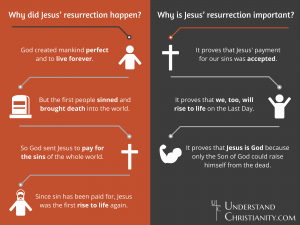If somebody told you they knew someone who died and came back to life, what would you think? You’d probably think they sounded pretty crazy, right? Well, Christians sound pretty crazy then. The central event in all of Christianity is the resurrection of Jesus, his coming back to life three days after he died for everyone’s sins. Why is it the central event? Because it’s what the promise of the Savior, the forgiveness of sins, the blessing of justification, and the Son of God becoming a human being are all about. It’s also the logical conclusion to God fulfilling his promise to Adam and Eve.
Did I just say that someone coming back to life was logical? Yes I did. And why does that sound crazy? Because on this earth all living things die. Humans aren’t excluded: humans are conceived, then they grow, and eventually they die. And when they die, they stay dead—no one comes back to life. It has become such a constant part of our existence here on this earth that it’s almost impossible for us to imagine otherwise. And yet, while it has become such a constant part of this life, it was never meant to be a part of the world God had created. God created all things to live, and to go on living. It was sin that brought death into the world (that is covered in the section Sin and Repentance). That’s why God sent Jesus—to remove sin and death from the world.
Jesus’ Resurrection
“I am the resurrection and the life.”
John 11:25
After Jesus had paid for the sin of the world by dying on the cross, God raised him back to life. The events of Jesus’ resurrection are told near the end of all four Gospels (Matthew 28, Mark 16, Luke 24, and John 20-21). Turn to those chapters in the Bible for the full picture, but a very quick summary is as follows: After Jesus died on the cross, he was buried in a tomb and a stone was rolled in front of the entrance. The enemies of Jesus had the tomb sealed and guarded so no one could fake his resurrection (Matthew 27:62-66). But three days later, an angel rolled the stone away to reveal an empty tomb. One of the angels told a few women who were visiting the tomb that Jesus wasn’t there because he had risen back to life. Jesus later appeared to those women, and they reported to his disciples everything that had happened. Later, Jesus appeared to his disciples and, over a period of 40 days, to many other believers as well (Acts 1:3; 1 Corinthians 15:3-8). Then he went up into heaven before their very eyes (Mark 16:19; Luke 24:51; Acts 1:2, 9).
Prophesied in the Old Testament
The resurrection had been prophesied in the Old Testament long before the Savior came and died. About 1,000 years before the time of Jesus, Israel’s King David declared in faith to God, “You will not abandon me to the grave, nor will you let your Holy One see decay” (Psalm 16:10). This prophecy is further explained in the New Testament by the apostle Peter: “Brothers, I can tell you confidently that the patriarch David died and was buried, and his tomb is here to this day…Seeing what was ahead, he spoke of the resurrection of the Christ, that he was not abandoned to the grave, nor did his body see decay. God has raised this Jesus to life, and we are all witnesses of the fact” (Acts 2:29, 31-32). Another apostle, Paul, adds: “For when David had served God’s purpose in his own generation, he fell asleep; he was buried with his fathers and his body decayed. But the one whom God raised from the dead did not see decay. Therefore, my brothers, I want you to know that through Jesus the forgiveness of sins is proclaimed to you” (Acts 13:36-38).
“I know that my redeemer lives, and that in the end he will stand on the earth.”
Job 19:25
The resurrection is also prophesied elsewhere in the Old Testament. The prophet Isaiah foretold the suffering of the coming Savior, and then added: “After the suffering of his soul, he will see the light of life and be satisfied” (Isaiah 53:11). Job, a man in the Old Testament who was faced with many troubles in his life, also looked forward to the coming Savior and confessed, “I know that my Redeemer lives, and that in the end he will stand upon the earth” (Job 19:25). After Jesus rose from the dead, he explained to his disciples that the resurrection of the Savior had been predicted in the Old Testament. He said, “This is what is written: The Christ will suffer and rise from the dead on the third day, and repentance and forgiveness of sins will be preached in his name to all nations” (Luke 24:46-47).
Prophesied by Jesus
Jesus even prophesied throughout his ministry that he would die and come back to life. One of the ways Jesus taught this was by pointing to “the sign of the prophet Jonah” (Matthew 12:39). Jonah was a prophet from the Old Testament whom God had saved from drowning by sending a large fish to swallow him for three days (speaking of crazy events–Jonah 1:15-17). Jesus said, “For as Jonah was three days and three nights in the belly of a huge fish, so the Son of Man will be three days and three nights in the heart of the earth” (Matthew 12:40). Son of Man was an Old Testament name for the coming Savior (Daniel 7:13-14) that emphasized his humanity and servant-like mission. Using the account of Jonah, Jesus was telling everyone that he would die on behalf of the world and then only be buried for three days and three nights.
Jesus also used the Jewish temple in Jerusalem to teach the people about his coming resurrection. To the Jews, the temple was a place for God’s presence to dwell. One day, Jesus cleared from the temple some people who were dishonestly selling animals for sacrifices. The Jews asked him, “What miraculous sign can you show us to prove your authority to do all this?” Jesus replied, “Destroy this temple, and I will raise it again in three days” (John 2:18-19). John, one of Jesus’ disciples and the one who wrote this account, added, “The temple he had spoken of was his body. After he was raised from the dead, his disciples recalled what he had said” (John 2:21-22).
Why is Jesus’ Resurrection Important?
“He will swallow up death forever. The Sovereign Lord will wipe away the tears from all faces; he will remove his people’s disgrace from all the earth.”
Isaiah 25:8
What makes the Savior’s resurrection so important that it would be prophesied so many times? First of all, it proves that Jesus is God. Jesus said many times that he is God (see the section The Trinity). He also proclaimed that he would raise himself from the dead (Matthew 26:61; John 2:19, 10:17-18). The apostles tell us that God is the one who raised Jesus from the dead (e.g., Acts 3:15; Romans 4:24; 1 Thessalonians 1:10). By raising himself from the dead, Jesus was giving clear proof that he is God.
The fact that God raised Jesus from the dead also proves his payment for our sins was accepted. As the apostle Paul explained, “He was delivered over to death for our sins and was raised to life for our justification” (Romans 4:25—this verse should be translated from the Greek as “because of our justification”; justification is explained in Justified by Grace through Faith). He says in another letter, “If Christ has not been raised, your faith is futile; you are still in your sins” (1 Corinthians 15:17). If Jesus hadn’t been raised to life, then it would show that he hadn’t fulfilled God’s promise to Adam and Eve—to pay the punishment of mankind’s sin, the very thing that brought death into the world. But by raising Jesus to life, God was declaring to all people that Jesus had indeed successfully paid for sin and conquered death for all people.
Since Jesus’ resurrection proves he has conquered sin and death, it also proves that we will rise to life someday. Paul calls Jesus “the firstfruits of those who have fallen asleep” (1 Corinthians 15:20). Jesus is the first one to be raised from the dead in the same way that the first fruit growing on a tree is a sign that more will come. “For as in Adam all die, so in Christ all will be made alive. But each in his own turn: Christ, the firstfruits; then, when he comes, those who belong to him” (1 Corinthians 15:22-23). When Jesus comes again at the end of the world (Isaiah 65:17; Acts 1:11; Revelation 21:5) he will raise all people back to life with immortal and imperishable bodies (1 Corinthians 15:50-57), both believers and unbelievers (John 5:29).
“Because I live, you also will live.”
John 14:19
The apostle Paul even acknowledged the importance of this fact when he was on trial for his faith. Defending his faith, he said, “I stand on trial because of my hope in the resurrection of the dead” (Acts 23:6). Later, he pleads his case again, “I have had God’s help to this very day, and so I stand here and testify to small and great alike. I am saying nothing beyond what the prophets and Moses said would happen—that the Christ would suffer and, as the first to rise from the dead, would proclaim light to his own people and to the Gentiles” (Acts 26:22-23). Paul’s confession in his faith and in the forgiveness of sins went hand-in-hand with the promise of the resurrection for all people.
Crazy Talk
Since death is such a constant on this earth, a physical resurrection from the dead sounds pretty crazy. The apostles knew how crazy they must have sounded to others when they said that Jesus had come back to life. But as Peter and John declared, “We cannot help speaking about what we have seen and heard” (Acts 4:20). When a person performs miracles for three straight years, teaches truths that speak to right the soul, says that he’s God, says that he’s going to die and come back to life three days later, dies, and comes back to life three days later, you can’t help but tell people what happened no matter how crazy all of it sounds. You have to tell people about it all, and you hope that they’ll tell others, too. You hope that they’ll tell people about how sin came into the world, how God forgives us, how God declares us “not guilty” because of his promised Savior, how God describes himself in his Word, how God became a human being for us, and how God confirms it all by doing something the world has never seen.
Because of it all, we can be confident that everything God has proclaimed is true. Though we have to battle our sinful natures and the threat of death every single day, we can be confident that there will come a day when we don’t have to be concerned with sin and death. “There will be no more death or mourning or crying or pain, for the old order of things has passed away” (Revelation 21:4). And because we know the old order of sin and death will pass away we can declare, “Where, O death, is your victory? Where, O death, is your sting?” (Hosea 13:14; 1 Corinthians 15:55). It’s all because of God’s promise of forgiveness and life through our Savior Jesus. As he himself said, “Because I live, you also will live” (John 14:19).






